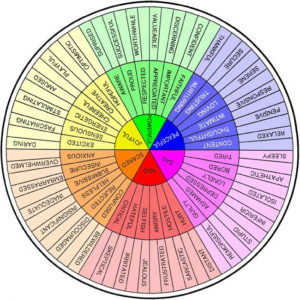(an abridged excerpt from the book)
Ughh feelings – always changing, often confusing and often out of reach of our conscious minds; getting to grips with them can be hard!
But being able to know how we are feeling is an essential life skill. I’m not even talking about knowing what to do with them – just to know what they are, and this is already above average for the general population. Really we should learn this in school, rather than in the therapist’s office for a select few.
In this brief overview we are going to look at 3 of the reasons that feeling your feelings is important, 3 reasons we may have stopped and a couple of ways to get in touch with them.
Reasons to feel our feelings
- Not being aware of our feelings can make us ill (sick) – it has been linked to higher mortality, chronic health conditions and physical pain.
- In order to deepen relationships we need to be emotionally intelligent; this has a big effect on our success at work and in our personal lives
- We cannot know ourselves and have a meaningful life without being able to get in touch with our feelings.
Reasons we may have stopped feeling our feelings
- It can hurt and if we push feelings down then things stay “manageable”
- We want to avoid conflict – better to ignore our own anger (and needs and desires) than to rock the boat
- This can keep us stuck and out of touch with ourselves
Ways to get in touch with our feelings
- Sense Your Body
When doing the exercise below try to stay as open-minded as possible and not get “into your head” too much. The goal is to connect with the feeling itself, not let our mind tell us what it is.
a) Sit somewhere quiet and comfortable, breathe and relax your body.
b) Notice if there are any sensations in your body that are more in the foreground, more obvious.
c) What is that feeling like, is it; warm, cool, light, heavy, a ball, spread out, tense, relaxed, does it have a shape, or a colour?
d) When you feel it quite clearly, say “hello” to it in your mind, and ask it if it wants anything/ has anything it wants to say. Wait with an open mind for its answer.
e) You can converse with this feeling, find a way to give it what it needs (in real life or through visualization, as relevant).
This is the abridged version of the exercise, but a really good starting point for getting in touch with your feelings. If you get stuck you can revisit this later, if it is new work for you it takes a little while to get used to.
2. Know the Words
One of the main problems my clients have when talking about their feelings is that they do not know the right word for what they are experiencing. If we are not brought up in a very emotionally-aware environment it is likely our vocabulary will be limited to very simple feelings; good, bad, stressed, sad etc.
If you are wondering what you are feeling, why not have a look at Gloria Willcox’s “Feeling Wheel” below which represents many of the common emotions, and try and find yours.
Once you have found it, accept it and acknowledge it within yourself.
Beyond the exercises above it is important to try and cultivate and open mind and an ability to accept what you are feeling. If we have made a judgment that certain feelings are unacceptable they go straight on the reject pile and play havoc under the radar, instead of just speaking to us like they are meant to.
I just want to leave you with the thought that emotions are the things that bring the world into colour. They can be subtle, nuanced and surprising. They make us human and life worth living. What are you doing to make space in your life for your feelings?
“Emotions, in my experience, aren’t covered by single words. I don’t believe in “sadness,” “joy,” or “regret.” Maybe the best proof that the language is patriarchal is that it oversimplifies feeling. I’d like to have at my disposal complicated hybrid emotions, Germanic train-car constructions like, say, “the happiness that attends disaster.” Or: “the disappointment of sleeping with one’s fantasy.” I’d like to show how “intimations of mortality brought on by aging family members” connects with “the hatred of mirrors that begins in middle age.” I’d like to have a word for “the sadness inspired by failing restaurants” as well as for “the excitement of getting a room with a minibar.” I’ve never had the right words to describe my life, and now that I’ve entered my story, I need them more than ever. ”
― Jeffrey Eugenides, Middlesex


You must be logged in to post a comment.